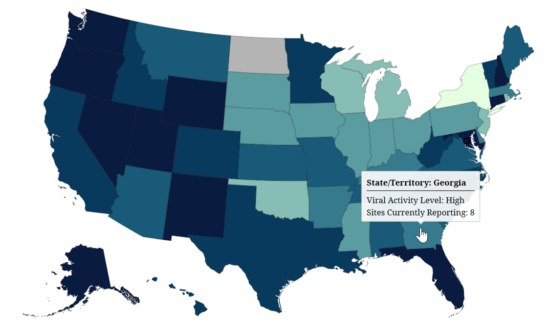Should acne meds come with birth control? Plus mucus-breaking robots, good flu news, and more
23 Jul 2024
Posted by Andrew Kantor
The only mucus-and-nanobot story you need to read today
Everyone know how much trouble it is to push through a wall of mucus, and it’s even tougher if you’re a drug molecule. That’s why Spanish researchers developed hydrogen peroxide-powered nano-robots that carry drug molecules though that wall.
The peroxide not only propels the ’bots, it also breaks down the mucus barrier long enough for the drugs to slip through “helping them sneak through the mucus defenses like a Trojan horse.”
[In the lab] The bots passed through the model’s mucus layer within 15 minutes, without significantly harming the cells underneath.
Then they tried it on mouse colons, and it worked there as well, with 28% of the nanobots successfully crossing the mucus barrier. That may not seem like a lot, but 1) it’s the first test of this technique, and B) “that 28% is a 60-fold increase over passive diffusion of particles.”
Medicare drug option coming
People with Medicare prescription drug coverage will have a new payment option next year, and CMS wants to be sure they’re aware of it.
Starting in 2025, Medicare patients can opt to be billed monthly by their plan provider rather than pay at the pharmacy counter.
What’s the difference? As part of the Inflation Reduction Act, annual Medicare prescription drug costs will be capped at $2,000 per patient starting in 2025. The new payment option will be good for people who have typically had high out-of-pocket costs — they won’t have to shell out that $2,000 in the first few months of the year; it’ll be a ‘smoother’ payment system for them, as insurers’ monthly charges are also limited by the IRA.
The latest universal flu vaccine
Scientists at Oregon Health & Science University and Pitt may have killed 11 monkeys to make their point, but that point was the latest potential universal flu vaccine. In fact, it could be a universal [insert-virus-name-here] vaccine if their technique works outside the lab.
Their vax uses a mild herpes virus to carry small pieces of the target virus to activate effector memory T cells. The advantage is that this type of T cell will attack a target based on its internal structure, rather than its outer shell. In other words, the virus can mutate all over the place, but the T cells still recognize it.
For an added twist, they tested this not against the current H5N1 virus, but the super-deadly one that caused the 1918 flu pandemic*. And it worked pretty well for a proof of concept: Six of the 11 monkeys exposed to the 1918 flu survived, while all six of the control group died.

* Don’t worry, they worked in a “highly secure biosafety level 3 laboratory” so there’s no chance of a virus escaping and causing a pandemic.
Speaking of H5N1…
Good news: The H5N1 vaccine in the US Strategic National Stockpile, which was designed to work against the variant that circulated in the early 2000s, also seems to work against the current clade. It’s not perfect, but it’s good enough to work as a “bridging vaccine” while a new one is developed.
Birth control with acne meds?
It’s been a while since we’ve written about anything controversial, so here you go: A pediatric dermatologist at Penn State is recommending that her peers prescribe emergency contraception along with isotretinoin (aka Accutane).
Why? Because isotretinoin presents a serious risk to a fetus, and “Not all teens taking isotretinoin can be trusted to be sexually abstinent.” Making sure those teens have Plan B or something similar available can save a lot of heartache later. (And, of course, levonorgestrel and ulipristal acetate are essentially birth control, not abortifacients, so they avoid that thorny issue.)
Home treatment Q&A
Q: Can drinking olive oil prevent a hangover by coating the stomach?
A: No.
If it was a snake, it would’ve bit me … but now I have a better anti-venom
Obviously we all worry about cobra bites, especially because the antivenom is expensive and, while it can save your life, probably won’t save the limb that got bit. (Can you say “necrosis”?)
We can all rest a little easier thanks to some Aussie researchers. They led a team that made a breakthrough — they found that cobra venom targets a human enzyme that produces heparan and heparin. So they gave the venom another target: good ol’ heparin — yep, the blood thinner. By flooding the bite with heparin, it binds to the venom before it can attack the cells.
This means that cheap, plentiful heparin can be added to existing cobra-bite treatments to help prevent the second-worst effect of the bite. (The first being, obviously, death.)
Covid update
Wastewater surveillance shows that SARS-CoV-2 is gaining ground across the country.(Georgia is reporting “High” levels — 7 out of 10 on the CDC’s scale.) The latest data show that almost one percent of all deaths in the country are from Covid-19 — that’s not insignificant.



